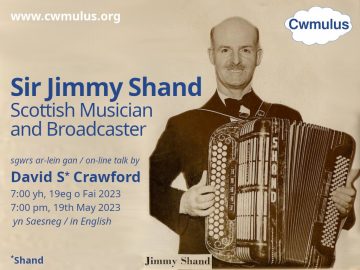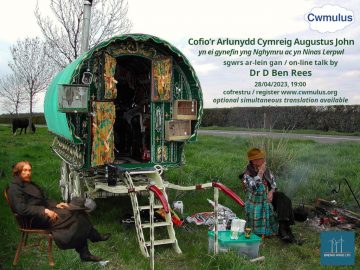Noticeboard
Sustainable Ogwen Valley
At 7.00pm on Friday 23 June Meleri Davies will give a talk entitled “Dyffryn Ogwen Cynaliadwy”, in which she will discuss the development of the Ynni Ogwen hydroelectric project from its initial idea through to the building and operation of this community energy scheme. She will also highlight the environmental and social benefits which the scheme has brought.
Meleri Davies is the Chief Officer of Partneriaeth Ogwen, one of the founders and a director of Ynni Ogwen Cyf and also a director of Community Energy Wales.
Cwmulus are hosting this on-line talk, which is in Welsh, with an optional English translation. Registration at this link.
Help for Welsh learners
Learn Welsh North West are running online Summer courses to give learners the opportunity to gain confidence and use the Welsh language with other learners.
Mae Dysgu Cymraeg Gogledd Orllewin yn cynnal cyrsiau Haf ar-lein i roi cyfle i ddysgwyr fagu hyder a defnyddio’u Cymraeg efo dysgwyr eraill.
Do have a look at their website … lots of ideas for learning Welsh for folk at all levels, both for distance and in-person learning, and the prices are extremely reasonable. The Bala course on 11-13 July even has on-site accommodation available for a limited number of learners for a modest additional fee: £100 (single room), £50 (shared room).
Sir Jimmy Shand
At 7.00pm on Friday 19 May David S* Crawford will talk about Sir Jimmy Shand – Scottish Musician and Broadcaster.
Jimmy Shand (1908–2000) was a Scottish musician who played and composed music for the accordion. In this talk, we will trace the career of this remarkable man from humble beginnings as a coal miner in Fife to becoming a successful recording artist and a well-known musician on radio and television. We will hear about his early work with the BBC, his time spent recording with Beltona Records, and then his recordings for Parlophone, where he was their best-selling artist until the Beatles came along in the 1960s.
We will also discuss “The White Heather Club”, a BBC Scotland TV programme featuring Scottish Country Music, for which Jimmy Shand wrote the introduction and was often the lead musician. It was launched in the late 1950s and was popular throughout Britain for many years. During that period Jimmy Shand and Andy Stewart (one of the programme’s presenters) could be regarded as the most prominent representatives of Scottish music to the other nations of the UK.
David Shand Crawford is Curator of the Wireless in Wales museum in Denbigh. He is an engineer who worked for many years in the field of broadcasting, for the BBC and other organisations.
This is another of the series of on-line talks hosted by Cwmulus. They’re usually interesting, all have Welsh connections, and many are given in Welsh with simultaneous translation. Details and registration at this link.
Memories of Dewi Bebb
Many of you will remember Geoff Parkhouse, a Welshman from Swansea who now lives in a village outside Kelso, and a keen amateur archaeologist/historian who gave a Zoom talk to EWS in May 2021 about the history of Ancrum (report at this link).
A year later, a group of members including Hywel Williams went to Ancrum for a walk/talk about what he’d said. After the River Teviot walk a few of them retired to the Ancrum pub, and that’s when Hywel and Geoff found a mutual regard for Dewi Bebb, the first Welsh Internationalist from North Wales (thought he was playing for Swansea at the time).
Geoff recently wrote to Hywel:
“Your mention of Dewi Bebb really brought back a long-held boyhood memory – my first rugby recollection. A crowded St Helen’s over Easter, sitting in the stand with my father and grandfather. I recall caps and big overcoats and that peculiar damp smell of them. I watched Dewi Bebb score what seemed to be a length of field try that day. The roar of the crowd. Dad and Grampa’s broad smiles and cheering. I hadn’t thought about this moment in many years, but your mention of the name triggered a flood of memories.
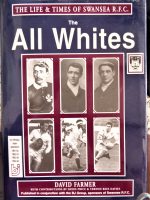 “I wondered how true the recollection was, as time warps everything. Chasing a memory, I dug out my book on ‘The All Whites’ (To be honest, a book I had hardly ever perused).
“I wondered how true the recollection was, as time warps everything. Chasing a memory, I dug out my book on ‘The All Whites’ (To be honest, a book I had hardly ever perused).
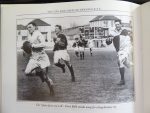 “Remarkably, there’s Dewi Bebb scoring his long range try against the Harlequins. (Swansea traditionally played the Harlequins and the Barbarians over Easter weekend)
“Remarkably, there’s Dewi Bebb scoring his long range try against the Harlequins. (Swansea traditionally played the Harlequins and the Barbarians over Easter weekend)
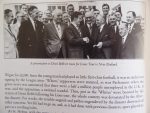 “Strangely, as I turned the adjoining page, there was a photo of Dewi Bebb being presented with a gift on becoming a British Lion. Strangely, because there in the right-hand corner of the photo stands a small man, Mark Parkhouse, my grandfather.
“Strangely, as I turned the adjoining page, there was a photo of Dewi Bebb being presented with a gift on becoming a British Lion. Strangely, because there in the right-hand corner of the photo stands a small man, Mark Parkhouse, my grandfather.
“There is a rather rounded satisfaction about all of this, in that your memories of one man from North Wales, triggered my memories of the very same man in South Wales, recalling a family moment I hadn’t thought about in years.”
Hywel adds:
“My mother was a primary teacher in Hawick at the time Bill McLaren was on his way up as rugby commentator, and she taught Bill how to pronounce ‘Dewi’. He soon got it perfect! She had been taught by Dewi’s grandfather a century ago when she was at Bangor Normal Coll (teacher training in North Wales). Hence her interest in Dewi, though she had no interest in rugby despite living in Hawick! As an aside, my father never saw a rugby game in his life, and that despite my younger brother Trefor getting a few games for the “Greens”!”
Click the thumbnails to get a larger image, which opens in a new tab.
Remembering Augustus John
At 7.00pm on Friday 28 February Dr D Ben Rees will give a talk entitled “Remembering the Welsh Artist Augustus John: in his home in Wales and in the City of Liverpool”.
Augustus John came from Tenby, and from his mother and the local art school he got the urge to paint. He and his talented sister Gwen John were encouraged to consider further training at the Slade School of Art. The lecturer suggests that the shy boy from Pembrokeshire became a real bohemian after a nasty accident when he jumped into the sea from a rock near his home and injured his brain. He resumed his education after months at home.
He came to Liverpool with his young wife in 1901, to lecture in the art school associated with the university. There he met the university librarian John Sampson, an authority on the Welsh Gypsies, and Augustus adopted the Gipsy way of life. He didn’t stay long in Liverpool, where David, his first son, was born, but he did make a great impression on the Celtic City. A pub on the university campus was named after him in 1967 and an exhibition of his work was staged last year.
Dr D Ben Rees, the Minister Emeritus of Capel Bethel, Liverpool, is well-known in the city as a local historian. He is giving this lecture as a foretaste of a festival to remember Augustus John and his friend John Sampson, which is going to be held in Liverpool on 17 June by the Merseyside Welsh Heritage Society.
Cwmulus are hosting this on-line talk, which is in Welsh, with an optional English translation. Registration at this link.


